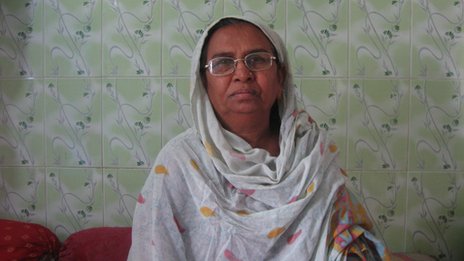
"My life is now just about raising my voice and getting justice for the helpless," Niaz said. (BBC photo)

GUJARAT – The hacking and burning to death of Muslims in the western Indian state of Gujarat have galvanized Muslim women to raise up their voices against injustice.
“It’s all about securing justice by raising my voice,” Niaz Apa, a Muslim woman from Juhapura in Gujarat’s main city of Ahmedabad, told the BBC on Tuesday, March 27.
“When the owners of the cheap food shops cheat us, I take up the cudgels. If the police station refuses to register a case, I raise my voice.”
Ten years ago, when the deadly riots erupted in Gujarat in 2002, Niaz was the “richest woman” in the relief camp, where she stayed for eight months.
“I had land, I had a home,” she said.
The Hindu attacks came to change the life of the Muslim housewife.
“But my house got burnt down during the riots, and I sold my land in a distress sale and moved into this hovel, which is now my home,” Niaz added.
At least 2,000 Muslims were hacked and burned to death by Hindu mobs in 2002 after 59 Hindu pilgrims died in a train fire first blamed on Muslims but which a later inquiry concluded was accidental.
Several investigations at the state and federal levels accused police of failing to protect Muslims under orders from Gujarat chief minister Narendra Modi and his aides, fanning one of the worst instances of sectarian violence in India.
The Gujarat carnage, the worst religious violence India had seen in years, continues to cast it pale on Muslim-Hindu relations in the troubled state.
Despite the national outcry, little has been done to catch Hindu extremists responsible for the massacre of Muslims.
Suffering in the relief camp, Niaz was denied justice in an Indian court when she identified the men who had torched her house.
“There were 12 of them, they had grown up in front of my eyes,” the Muslim woman recalled.
However, the judge asked her to compromise with the men.
“He said just go ahead and compromise. Nothing is going to happen. And nothing did happen.”
To overcome her woes, she now works with the community and riot survivors, going to police stations, courts and cheap food shops.
“My life is now just about raising my voice and getting justice for the helpless,” Niaz said.
Injustice Fighters
Women like Niaz were leading a revolution in the beleaguered Muslim community in Gujarat, working with riot victims to fight for their cases.
“I was shocked when I saw the survivors,” Noorjehan Abdul Hamid Dewan told the BBC, recalling the first days of Gujarat massacre.
“I saw a girl and a boy, siblings, who had been set on fire by the mob, die in front of my eyes.
“There were about 5,000 people in the camp. I didn’t know what to do, and I felt helpless,” the 38-year-old woman said.
Returning home, she told her husband about the experience she has been through, making up her mind to return back to offer help.
“I decided to go back and help. The camp haunted me,” Noorjehan said.
Latifabano Mohammad Yusuf Getali from Godhra is also fighting for justice for Gujarat Muslim victims.
“I was in the burqa when the riots happened,” Latifabano, 49, told the BBC.
“I had no idea of the world outside.”
Now, Latifabano is a leading relief and peace activist, who was picked up as one of the 1,000 PeaceWomen for the Nobel Peace Prize in 2005.
“From the uneventful life of a Muslim housewife to a relief and peace activist, she has walked a long mile”, says the citation by the organization.
“Braving the wrath of her conservative community, Latifabano has helped hundreds of Muslim women in the state gain access to relief and legal assistance.”



